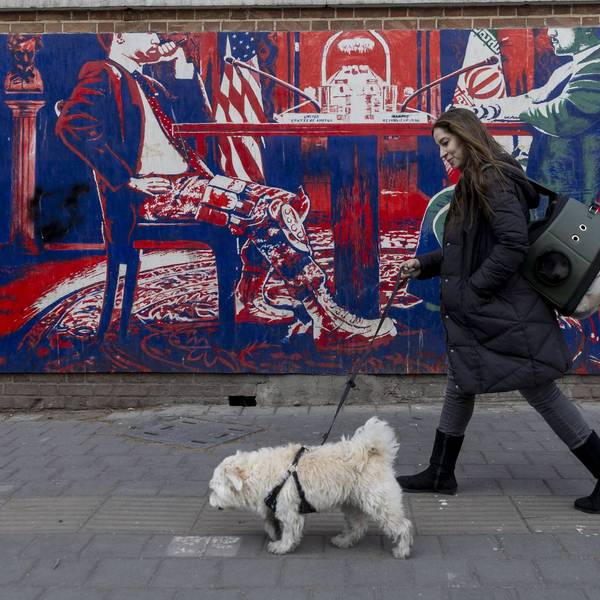Iranian civil society activists, artists, and scholars are reaching out to the people of the United States with an urgent appeal: Don't let your government reject the nuclear deal, and thereby clear the path to war and devastating sanctions.
"We are deeply concerned about the consequences that might result from the rejection of this nuclear agreement," reads an open letter, which was released Monday and signed by 52 prominent pro-democracy campaigners, professors, film-makers, poets, and former members of parliament. "Economic sanctions against Iran will increase, as will the likelihood of war. This would be a catastrophe for the Middle East."
"Another war in this region would strengthen the forces of extremism and undermine the forces that work for nonviolence, peace and reconciliation; the ripple effects of another war would be felt far and wide, and would destabilize the international system for years to come," the letter warns.
Nader Hashemi, the director of the University of Denver's Center for Middle East Studies and co-editor of The People Reloaded: The Green Movement and the Struggle for Iran's Future, told Common Dreams the letter came together after "some prominent Iranian pro-democracy activists, intellectuals, and reformists sent a message to their friends and contacts in the United States expressing concern over the debate here in the United States on the nuclear accord."
The hope is that the letter "could shape the debate in some positive way," explained Hashemi.
Open letters have been a commonly used tool to influence discourse as Congress nears its key vote on whether to approve the deal, which was reached between Iran, the United States, Russia, China, United Kingdom, France, Germany, and the European Union in mid-July. As per recently-passed legislation, the U.S. House and Senate were given a total of 60 days to review the final accord, and the final vote could take place as soon as September 9.
Monday's missive raises the hope that, eventually, Iranian activists will not have to turn to public statements to spark such discussions. "We look forward to a day in the future when Iranians no longer have to write open letters to Americans, but can meet face to face with mutual respect and dignity based on shared civilizational values that bind us together as citizens of this planet," the letter states.
Moreover, the letter comes amid an escalating grassroots push, as people across the world stage rallies, sign petitions, and call representatives urging them to accept the deal. Advocates of the accord are up against a well-heeled campaign against the deal being waged by legislative hawks, AIPAC, and Israeli Prime Minister Benjamin Netanyahu.
People in Iran, and the diaspora, have been a key voice calling for diplomacy. In August, Iranian civil society leaders unveiled a social media campaign rallying support for the deal in a series of short videos. Organizers in the Iranian diaspora have staged rallies around the world backing the agreement.
And in June, the International Campaign for Human Rights in Iran released a report showing that the country's civil society leaders unequivocally support a nuclear deal with Iran. Interestingly, the report concluded that support for the deal among interviewees is unanimous--even among those critical of the government and skeptical that benefits will be fairly distributed.
According to Hashemi of the University of Denver, this support is strong because the alternative would be potentially catastrophic: "It would open a pathway to another war in the Middle East, this one against Iran, which would be devastating for Iranian society. It would likely lead to increased economic sanctions which would have horrible impacts. What is often forgotten in the U.S. is that sanctions adversely affect the average citizen, not the ruling elite."
Also, continued Hashemi, "political rejection of the deal would strengthen hard-line conservative forces in Iran who are strongly opposed to this deal and in many ways mirror the rhetoric and attitude of Republicans in United States."



